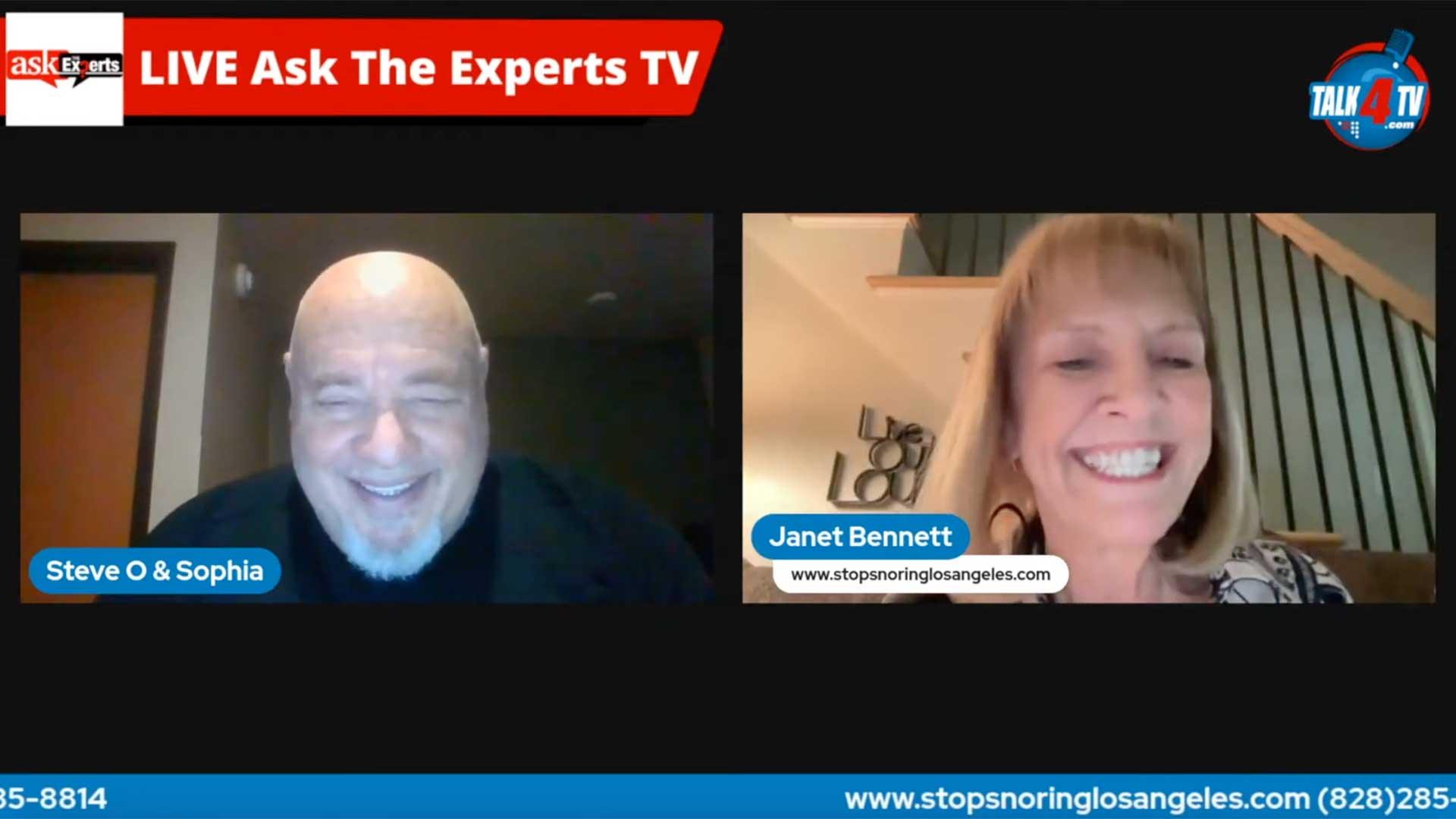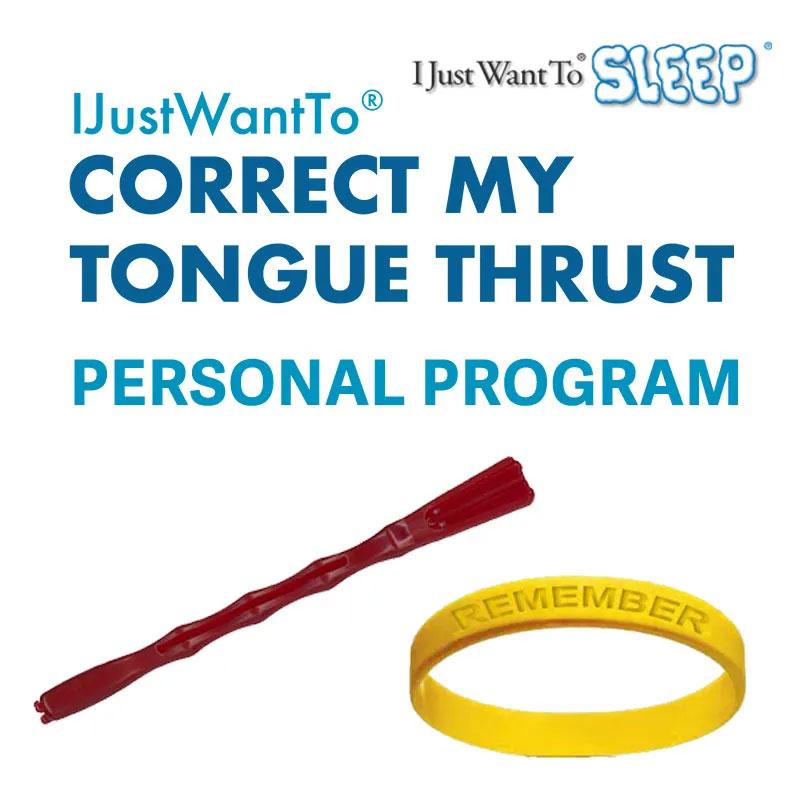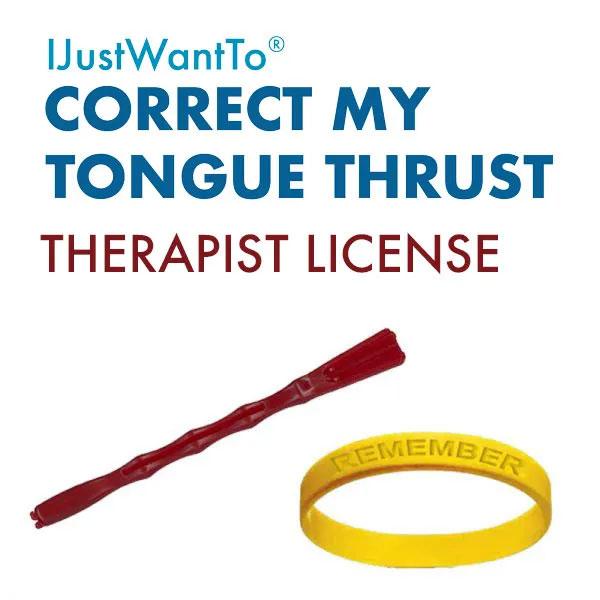But, she has a way she has a technique that I'm hoping she's going to get me out of my CPAP machine. Let me welcome you now to my good friend, Janet Bennett.
Janet Bennett: Hello, thanks for having me on.
Steve O: You're in a big area Janet with stopsnoringlosangeles.com yes and actually, from our last show, it's stop snoring California because we got two calls from the Bay Area.
Janet, you're going to be my angel because you're going to be my savior, well, I have a main savior, but you're going to be my other savior. Listen, if you snore, if you have a partner, whether it's a wife or husband that snores, you do not want to miss today's show. I want to introduce you to my friend Janet Bennett.
Tell everybody about your practice.
Janet Bennett: Okay. I'm a speech pathologist and I have a Master's degree in Speech Pathology. I have had my own practice for close to 40 years if not more. For the past 20 years, I have specialized in the treatment of tongue thrust.
Steve O: Tell everybody what tongue thrust is.
Janet Bennett: I'm sure you've seen people who have buck teeth, or you've seen people who have an open bite where their teeth won't close and that's because when they swallow, their tongue pushes the back of their teeth or it comes between their teeth. That can be very bad for their teeth and so orthodontists want to fix their bite so their teeth are gorgeous. If they don't send them first to someone like me, then their teeth will go right back where they were when the braces come off. I've worked with people who have had three sets of braces and finally, the orthodontist decides the tongue thrust needs to be fixed. A tongue thruster is usually a mouth breather and usually has a wide tongue.
More than half of the people in the world probably have a tongue that's too wide for their mouth. When a tongue thruster sleeps and the muscles relax, their wide tongue helps their lips fall apart and they find themselves mouth breathing. They start snoring because they are mouth breathing and air is going in and out, hitting the uvula, that thing that hangs down in the back of your throat, and that makes the noise. If you do that for a long time and your snoring may get louder and louder and that can turn into sleep apnea.
So, here we go from tongue thrust to mouth breathing to snoring and then to sleep apnea. Sleep apnea happens when your tongue totally closes up your airway and you stop breathing. There's a part of your brain that will wake you up and that is when you have to snort yourself awake. Your head may shake and your significant other jumps! That is what saves your life! That's how all of these things are connected. You'll hear from me about the importance of correcting tongue thrust and mouth breathing.
I have created a program of just tongue exercises that fix all of those problems, so don't think that you have the wrong program if you hear about tongue thrust. The exercises help with all of these problems, which is great.
Steve O: Janet, you know we don't want to scare people but a lot of people do not understand about sleep apnea, and they kind of blow it off but it's very dangerous.
Janet Bennett: Yes, it is. If you think you have sleep apnea, your doctor would be the one to refer you for an overnight sleep study. They are now allowing in-home sleep studies with something you wear on your finger that keeps track of your sleeping habits.
If you wake up during the night five times an hour or less then that's not considered sleep apnea. You probably still have some symptoms because you're still mouth breathing. A lot of people have severe sleep apnea and they might stop breathing 65 to 80 times an hour, if not more, and that can be scary. If you stop breathing once a minute, what's that doing to your heart? Every time you snort to wake up, it's really weakening your heart. To stop snoring and to stop mouth breathing would take care of that problem.
Steve O: Janet, you said something on one of our other shows that I kind of glossed over but it is so important Janet. When you have sleep apnea and you’re waking up so many times, you’re not getting proper sleep. I’ve got to tell you that you reminded me of something. I found myself falling asleep sometimes at the wheel! All of a sudden, out of nowhere. There are a lot of auto accidents where people fall asleep because they don’t get proper sleep because of sleep apnea.
Janet Bennett: You are right. I'm so glad you brought that up.
Lots of accidents happen. If you are not sleeping well, you've got to be aware of that but unless you get treatment for sleep apnea, you will always be a danger to other drivers. Whenever you breathe through your mouth at night, you can't get into REM sleep. I don't care what you do, you cannot get to REM sleep. That means you are not going to get good sleep, period. You can wake up with a drymouth- you can wake up with a headache that lasts just a few minutes - you can wake up with a sore throat that goes away in a few minutes- and you can have daytime sleepiness while driving home or after lunch. You might feel bloated. You might have stomach issues.
There are all kinds of things that happen because of mouth breathing and most people can't imagine connecting being bloated with mouth breathing. It's just amazing what things will get better when you learn how to breathe through your nose.
Steve O.: Listen, we talked about this the other day too . A lot of people won't admit that they snore. I was one of them. My wife kept saying to stop snoring but I said I wasn’t snoring. Snoring is not anything to be embarrassed about.
I love the story of the athlete you treated whose mother came in to see you. Tell us that story.
Janet Bennett: Okay, so that was in 2003, 20 years ago, and that is when my life was totally changed. I was treating a 14-year-old football player for a tongue thrust. That means that when he swallowed, his tongue didn't start in the right place on the roof of his mouth and this caused swallowing problems. I have a treatment program for that. It's seven weeks long and you have to do tongue exercises. They aren't hard and they don’t hurt. This guy, Adam, had already done two weeks' worth of exercises. He came to see me the third week and his mother came in the door and she said, “Janet, what are you doing to Adam? I asked her what she meant and she said, “Well, he's always been the loudest snorer in the world. The windows rattled at our house and now he's not making a sound!
I didn't know anything about snoring, but I asked Adam to tell me more. He said that he could concentrate in school better and he’s getting more rest making better grades, AND I run faster!
The fact that he said he ran faster seemed more important than the fact that he slept better! I was so excited. I got on the internet and I knew I was going to find that they correct snoring with tongue exercises.
No, I didn't find that at all. Here were the choices 20 years ago: Lop off your uvula; Break your jaw and move it forward so that your airway is bigger; or Purchase a six thousand dollar dental appliance that will keep your tongue out of the way of your airway. One of those appliances has a hole in the middle and the hole is for you to stick your tongue through that hole so it is sticking out of your mouth and it won't fall down and block your airway.
When you snore, your tongue is laying on the bottom of your mouth. Your tongue muscles relax and gravity starts pulling the tongue toward your airway. As your airway becomes partially blocked, you start making snoring sounds. Sometimes, your tongue successfully blocks your entire airway and that is when you stop breathing and a specific part of your brain wakes you up and you make a snorting sound. This is when your snoring has become sleep apnea. It doesn’t always turn into sleep apnea but the gasping and snorting are indicators of sleep apnea.
Because Adam, the 14-year-old football player, had such profound results with the tongue exercises, I decided that I had to save the whole world! [Laughter] I knew I couldn't sit on this information. It was too easy. The other treatments available on the Internet did not have a good success rate. Only 4% of those who had a CPAP machine actually used it and the others kept theirs in the closet.
Steve O.: Janet, I forgot to tell you that there was a doctor that advertised a surgery to stop snoring. He had ads everywhere and I just realized I haven't seen that ad in probably four or five years and it's like maybe that didn't work as well as they thought.
Janet Bennett: That's probably right. There are lots of different kinds of surgery available. Steve, we ought to talk about all the other treatment choices that are available. Because of what happened with Adam, the football player, I needed to develop a program that was easy enough for individuals to learn and treat themselves with written/visual instructions. I also wanted to make sure that the exercises worked for others as they did for Adam, the football player.
I found 86 people from all over the US who agreed to be my guinea pigs and help me word the treatment program in an easy-to-understand way. This was in 2003, and we didn’t have Zoom. I emailed them the lesson each week, and we talked on the phone and made sure they understood how to do their exercises. It took me 8 months to treat all 86 people.
94% STOPPED SNORING.
The specific goals for this program are:
- Train your tongue to live on the roof of your mouth.
- Stop mouth breathing and breathe through your nose.
- Swallow with your tongue in the correct position.
Steve O.: I am going to start this program next week. We're not putting down the CPAP machine. I sleep with the CPAP machine and it is the most uncomfortable way to sleep but you do stop snoring and you feel better when you wake up.
I'm going to feel so much better if I don't have to wear the mask anymore. I am so excited that you found this because, Janet there are so many people out there that snore and don't even know it's probably sleep apnea.
Janet Bennett: I think that snoring might be the number two reason for divorce.
Steve O: I believe that, I totally believe that.
Janet Bennett: Some people believe their tongue is too big for their mouth. They literally don’t know where it should go or what to do with it. I've discovered that we can make your tongue skinnier. Now how are we going to do that? I have invented this stick. It's called the tongue stick because I couldn't think of anything else! This tongue stick is kind of weird but it is the best thing about this program. All you do is stroke the sides of your tongue to strengthen the muscles. You will learn how to do an isometric exercise with your tongue and the stick to make your tongue more toned. None of this hurts, it's not hard and it doesn't take long to do them.
You have to practice two times a day. I have created videos to help you practice your exercises. You go to a special website and I'm sitting at my desk in my exercise room waiting to do the exercises with you. All you have to do is copy me. I will count for you if needed or time the exercise if needed.
You don't have to read anything or remember anything. You just copy me and then you leave and come back the second time that day or maybe you can do those yourself that evening.
Steve O.: How long does it take to do them?
Janet Bennett: Maybe 15 minutes. It doesn’t take long. This tongue stick is very important. It's an easy program and it doesn't hurt. It could change your life. You will wake up feeling refreshed, you won't have a headache, you won't get sleepy during the day and you'll have more energy. People tell me they can't believe all the energy they had when they woke up. The energy results from you getting better sleep. When you breathe through your mouth, you get dirty cold air in but when you breathe through your nose you get warm filtered air because of those hairs in your nose.
There's this gas that we make and it's called Nitric, not nitrous, oxide. Nitric oxide is made mostly in your sinus areas. When you breathe through your mouth your body, oh wait, before I say that - nitric oxide is what keeps regulating your blood flow and oxygen level and it touches probably just about every organ in your body as far as helping to maintain and regulate. I'm not a doctor so you can research it and see it is a much-needed gas for your body.
When you breathe through your mouth, your body doesn't release that nitric oxide in your sinuses. When you sleep with your mouth open, and it only has to be open a little bit, your body is not able to have access to that important gas. When you breathe through your nose, all of a sudden, your body can make nitric oxide and you are allowed to REM sleep and that's what makes you feel so great when you wake up.
Steve O.: You know Janet, I don't even know if I've told you this or not. I am so impressed with you because, first of all, you never promise 100% success. It’s not a pill, or tape that goes on your nose. It’s not an apparatus that you put in your mouth. It is exercises so you’re not coming on like you are a doctor. You’re coming from success and it makes so much sense. What is it going to hurt to try it? You know, it’s so easy, 15 minutes a day, to not have to wear a mask the rest of your life.
Janet Bennett: Right and I'm sure a lot of people are sitting there wondering what happens after the seven weeks are up and they've done all seven lessons. You are sleeping good, feeling great but now what's going to happen? Are you going to go back the way you were?
I have created a Maintenance Program for you to use if you ever think that you are not keeping your tongue up on the roof of your mouth or if you think you are starting to breathe through your mouth again. If you get sick and have a stuffy nose, you may have to breathe through your mouth until you get well. Your tongue muscles have muscle memory and will remember you created a new habit and you should be able to return to nasal breathing easily. You may have seasonal allergies and you can't breathe through your nose during that time. You are allowed to breathe through your mouth during that time.
The maintenance program gives you some exercises that you can do if you ever feel like your tongue is not always staying up on the roof of your mouth. Just do a few exercises for a couple of days or weeks to remind your muscles where they are supposed to be.
Steve O.: Give everybody listening on the radio because your phone number and your website.
Janet Bennett: www.stopsnoringlosangeles.com area - 828-285-8814
Steve O.: I'm going to start on the program and every week I'm going to report to you. I really believe it's going to work. It makes sense.
Janet Bennett: If I may throw this in, it will not work if you cannot physically breathe through your nose. If you cannot breathe through your nose because of a deviated septum, polyp, etc., visit an Ear, Nose and Throat doctor and get your nose fixed.
If you don't get it fixed, you will forever be this way. You will forever be a mouth breather and unable to get a good night’s sleep.
Steve O.: Janet, thank you so much. We will see you again soon. Have a good week, everybody and thanks for tuning in today to the Ask The Expert Show on W4CY radio and talk for TV.



